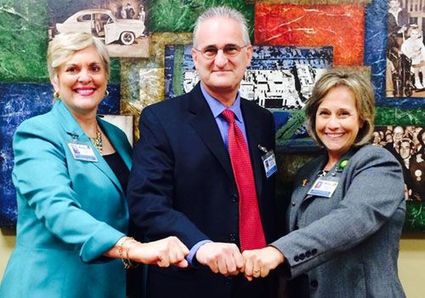'Shake the Handshake,' Urges Kaiser
Fist Bumps May Help Prevent Disease
November 13, 2014
We're entering that time of year when holiday greetings are, unfortunately, often interspersed with a hearty "Achoo!" Leave it to Kaiser Permanente West Los Angeles Medical Center ("Kaiser") to come up with a clever way to help avoid the flu and other bothersome bugs that are particularly prevalent during this busy celebratory season. Their suggestion: substitute fist bumps for handshakes.
Accordingly, hospital staff, physicians and patients are foregoing handshakes in favor of fist bumps to bring awareness of how easily germs spread, and to emphasize the importance of protecting oneself and others from the flu and other viruses and bacteria.
No one can quite agree on the origin of the fist bump, which has been variously attributed to boxers as far back as the late 1800s tapping gloves in the ring before a match; bikers sitting at a stop light and using this quick means of mutual acknowledgment; African American soldiers dapping (giving ritualized handshakes) during the Vietnam War; athletes celebrating by tapping knuckles instead of shaking hands in order to minimize the risk of dislocating a finger; kids on city basketball courts, where fist bumps evolved out of slaps and shakes to celebrate wins; and a Hanna-Barbera superhero cartoon, The Super Friends, that ran on ABC for several years starting in 1973, featuring the Wonder Twins who would touch knuckles and cry, "Wonder Twin powers, activate!"
Whatever its history, the fist bump is powerfully entrenched into our culture, and its application in a hospital setting and elsewhere can be very beneficial as it's been found that preventive behavioral modifications, however small, can actually prove consequential.
According to a recent study from researchers at Aberystwyth University in the United Kingdom, this act alone can reduce the spread of infectious pathogens by up to 80 percent. In fact, results of the study showed that the handshake transmitted the most potentially disease-causing bacteria compared to other greetings, such as the "high five," with the fist bump having the lowest germ transfer rate of them all. The study revealed that a handshake transfers about 10 times more germs from one person to another than a quick fist bump.
"A handshake involves more skin to skin contact time than a fist bump and therefore provides a greater opportunity for viruses and bacteria to spread," explained Kalvin Yu, M.D., regional chief of infectious diseases at Kaiser.
He emphasized that while a fist bump can help reduce the spread of the flu virus, the most effective way to prevent it is to get vaccinated. "We can post more flyers that say 'Get your flu shot' but the fist bump is a novel and fun approach to attract attention to the importance of getting the flu vaccine," Dr. Yu said, acknowledging that although the handshake is a cultural norm, and some will always prefer to use this greeting, the goal is to bring awareness of how easily germs spread and the importance of getting that protective vaccination.
Many Kaiser staff and physicians have already implemented this informal and whimsical procedure and are bumping fists instead of shaking hands.
"There is a greater awareness that hands are particularly risky body parts as we use them to open doors and touch elevator buttons, which may harbor and transmit infectious agents to our hands," Dr. Yu said.
Given the recent heavy media coverage regarding Ebola, the Observer also spoke with Dr. Holly Kim, an infectious disease specialist at Kaiser, who advised that the hospital "is taking the necessary steps to ensure our staff and facilities are fully prepared should a patient come to Kaiser Permanente with Ebola symptoms. We are committed to keeping our healthcare workers, members and communities safe. We have and will continue to implement best practices to protect those who could be called upon to treat and care for a patient with Ebola."
Dr. Kim is no stranger to health crises, citing H1N1 in 2009 and MERS this past year, and commenting that the current situation involving Ebola preparedness has been one of her most challenging experiences. "There are always new novel viruses, pathogens and outbreaks," she said, emphasizing that at Kaiser they "are able to adapt in a short period of time. We are geared to be flexible regarding adapting the protocols to whatever happens." As regards Ebola, "all requisite protocols are in place to quickly identify, isolate and treat, and with appropriate protective gear."
It should be noted that Ebola is hard to catch as it is not an airborne virus. All reports state that it can only be transmitted through direct contact with the bodily fluids of an infected and symptomatic person. From a practical perspective, the realistic likelihood of contracting the flu should be of much greater concern to the public. According to the CDC (Centers for Disease Control and Prevention), seasonal flu activity can begin as early as October and continue to occur as late as May. Sporadic occurrences have already been reported.
"The best protection to avoid catching the flu, other than the flu shot, is good and frequent hand washing," Dr. Kim said. "Additionally, if we all practiced cough etiquette by covering our coughs or sneezes and stayed home when we are ill, there would be fewer cases of the flu."
And let's not forget Dr. Yu's advice regarding the potential for infection via the traditional handshake, and how that can be diminished by substituting a fist bump.
Unsurprisingly, given Kaiser's commitment to protecting patients, it was just learned that all 14 Kaiser Permanente Southern California hospitals have again received an "A" grade in the fall 2014 Hospital Safety Score from The Leapfrog Group, an independent industry watchdog. The biannual survey rates how well hospitals protect patients from errors, injuries and infections, and also awarded an "A" grade to all 14 hospitals in its spring 2014 survey.
When it comes to wellness tips, Kaiser, which is recognized as one of America's leading health care providers and not-for-profit health plans, is clearly ready to lend a hand – or a fist, as the case may be. With all due respect to the creative minds behind the many exciting action films peppering the screen, those who help keep us healthy are truly real-life superheroes.




















Reader Comments(1)
Karinjoy writes:
Another wonderful and informative article. I think this is a creative and amusing idea for increasing awareness about hand washing and infection spreading. I am going to start practicing it myself and see what happens! You always write about what's right in this world, thanks to you, Sandra, I see there is a seemingly endless supply of this even just in and about Culver City.
11/20/2014, 5:19 pm